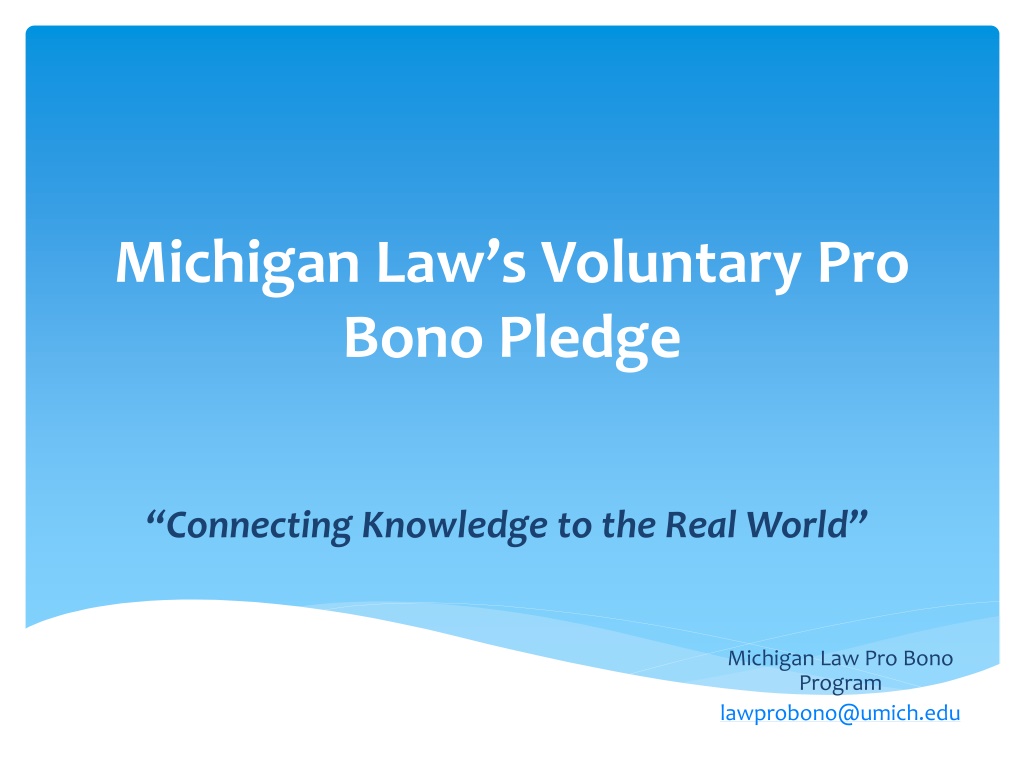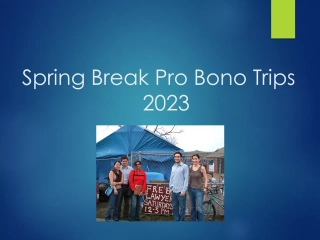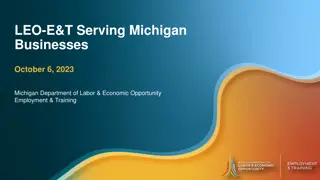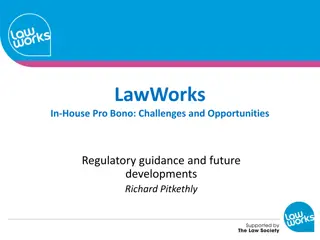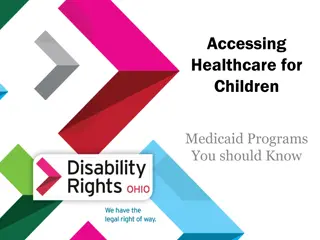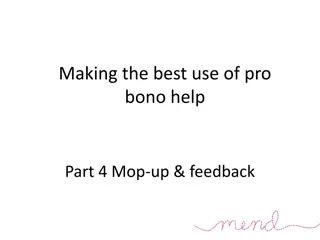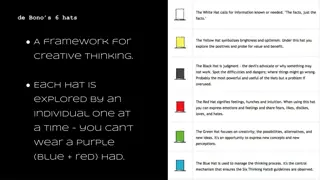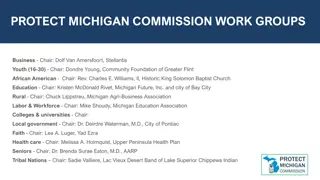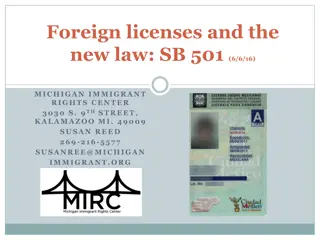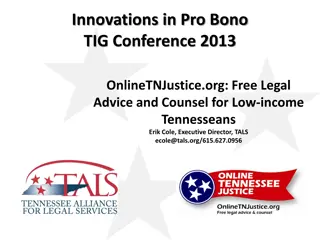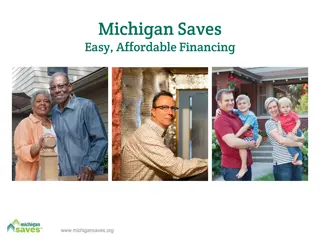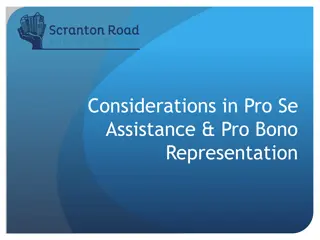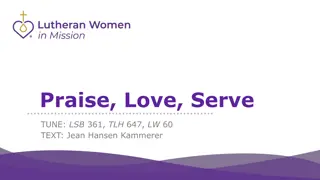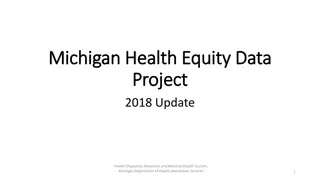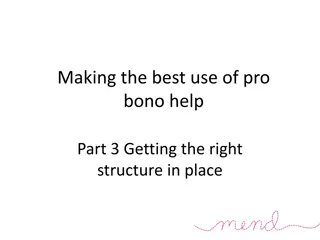Understanding Michigan Law Pro Bono Program and Pledge
Dive into the Michigan Law Pro Bono Program, which encourages students to engage in legal service, gain practical experience, and make a positive impact. Discover the benefits of pro bono work, the Pro Bono Pledge requirements, qualifying pro bono work criteria, and why it matters in the legal field. Get insights into how this program connects students with real-world legal experiences and serves underrepresented communities.
Download Presentation

Please find below an Image/Link to download the presentation.
The content on the website is provided AS IS for your information and personal use only. It may not be sold, licensed, or shared on other websites without obtaining consent from the author. Download presentation by click this link. If you encounter any issues during the download, it is possible that the publisher has removed the file from their server.
E N D
Presentation Transcript
Michigan Laws Voluntary Pro Bono Pledge Connecting Knowledge to the Real World Michigan Law Pro Bono Program lawprobono@umich.edu
The Players Amy Sankaran Director of Externship and Pro Bono Programs The Pro Bono Advisory Board students who plan pro bono events, give out awards, help student groups create and maintain projects, create a newsletter, and act as ambassadors for the Pro Bono Program generally.
The Statistics In the past three years, students have completed over 10,000 of pro bono service each year. For the past two years, over 200 students have logged pro bono hours on over 30 projects. 59 3Ls completed the Pledge last year and were recognized at a banquet, with a certificate signed by the Dean, and at the Honors Convocation. That s all great, but I KNOW you guys can beat it!
Why Should I Care About Pro Bono Work? Connect with what brought you to law school (not Torts, I m guessing?) Gain legal experience, which sets you apart from other applicants. Demonstrate interest in an area that isn t otherwise on your r sum . Try new areas of law without devoting classes, summers, or clinic choices to it. Networking, networking, networking. Learn new skills e.g., interviewing, research, writing, and case prep. Demonstrate time management to future employers. Learn about the communities that you can serve as a lawyer. At firms, pro bono work equals client contact and more responsibility. Finally, pro bono work is an ethical responsibility ABA Rule 6.1 states every lawyer has a professional responsibility to provide legal services to those unable to pay. A lawyer should aspire to render at least (50) hours of pro bono publico legal services per year.
What is the Pro Bono Pledge? The voluntary Pro Bono Pledge encourages students to perform fifty (50) hours or more of qualifying pro bono work during their three years in law school. Graduating students performing at least 50 hours of pro bono work receive a Certificate of Pro Bono Service from the Dean, recognition at an annual pro bono banquet, and acknowledgment during the Honors Convocation.
What is Qualifying Pro Bono Work ? Students work must be: 1. 2. 3. law related; supervised or approved by an attorney; provided to the client free of charge or at a substantially reduced rate; not for credit and uncompensated; at least 10 of the 50 hours must be completed while classes are in session (more on this in a moment); and provided to underrepresented persons, interests, or communities on behalf of a non-profit or government organization approved by the Pro Bono Program. 4. 5. 6.
Can You Give Some Examples of Qualifying Pro Bono Work ? Examples of qualifying work include but are not limited to: Law-related work on behalf of indigent clients at a non-profit organization (as defined under IRS sections 501(c)(3) & (4)); Law-related work at a Prosecutor s or Public Defender s office; Law-related work for a government agency or office; Law-related work for a student organization, such as the Public Benefits Advocacy Project or Family Law Project; Efforts to protect important legal rights and liberties at non-profit organization as defined under IRS sections 501(c)(3) & (4); and Educating the public s understanding of a law.
What Are Some Examples of Non- Qualifying Work? Examples of non-qualifying work include but are not limited to: Clerking for a judge; Assisting in political campaign efforts; Fundraising; Work done for a law journal or similar organization; Training hours or travel time; and Work that receives academic credit or compensation.
10 of the 50 hours must be completed while classes are in session To fulfill the Pledge, a student must complete at least 10 hours of Pro Bono work while classes are in session that is, during the semester, not during winter break, summer break, or between terms. The remaining forty (40) hours may be completed during the summer, between terms, or during winter break, so long as the work is Qualifying Pro Bono Work
Real World Examples If you work for a firm and complete a pro bono assignment, it would not qualify for the Pledge, since it was done for compensation in the normal course of your job duties. However, if your firm offered an optional opportunity to assist at an advice and referral clinic, outside of your work hours or on a weekend, the hours spent (up to 40 hours) would qualify under the Pledge. If you receive the Dean s Fellowship, an SFF grant, the Public Service Guarantee, or other summer funding, your summer job at a non-profit would not count toward the Pledge. However, if your organization allowed you to stay beyond the required 10 weeks and work without compensation, or you worked beyond the normal 40- hour work week, the extra hours you complete (up to 40 hours) would qualify under the Pledge. If you volunteer with an organization unrelated to your summer internship and the work otherwise qualifies under the Pledge, that volunteer work would qualify under the Pledge (up to 40 hours).
How Do I Sign Up?: The Pro Bono Institute SAVE the DATE: Friday and Saturday, September 20th and 21st What is it?
How Do I Sign Up?: Part 2 1. Take the Pledge 2. Review the Pro Bono Project Listings 3. Select a project and contact the Interest Contact in the listing to get started 4. Contact lawprobono@umich.edu with any questions
How Do I Report My Hours? Enter your hours in the Student Hours Tracking Database. When your project is complete or at the end of the school year, submit a Student Evaluation so we can have the benefit of your feedback (and we might use your quote as a testimonial with your permission). For 3Ls, all hours must be submitted no later than October 25th for December graduation and March 25th for May graduation.
The Fine Print By selecting a project and contacting an organization, you are agreeing to see the project through to completion and to create an outstanding work product for your organization. In return, you are receiving valuable legal experience and exposure to a field of law that interests you. Thus, please be cognizant of the fact that, by selecting a project, you are making a commitment to the organization AND representing yourself and the Law School in the community. As such, organizations will rightfully expect a certain level of professionalism from you and your work will determine whether the organization continues to utilize the pro bono program by providing projects for future students. If you have any concerns about fulfilling your responsibilities to the organization, please contact me to discuss those concerns BEFORE contacting the organization.
The Fun Part: Available Projects There are 4 main types of projects: 1) Databases 2) Internships 3) Research 4) Student Groups Current Pro Bono Project Listings
NY Bars Pro Bono Rule For those seeking admission after January 1, 2015, NY will require you to have completed 50 hours of pro bono work This is NOT the same as completing Michigan Law s Pledge. There is some overlap, but we count things they don t count, and they count things we don t. (see handy chart in Newsletter) Their FAQ is very helpful on our website at: http://www.law.umich.edu/careers/probono/Pages/NYbarr equirement.aspx Get an affidavit of compliance AT THE TIME of the work.
Questions and Answers Can 1Ls do pro bono work? Is there a smaller Pledge goal for LLMs? Can I perform more hours than the Pledge requires? Does training or travel time count toward the Pledge? Can I create my own pro bono project, or does it have to be arranged by the law school? Does pro bono work performed in conjunction with a student group qualify for the Pledge? What about work done through clinics or externships? Can I get pro bono credit if I did the project a year, or even two years ago? What should I do if I am experiencing problems with my project, organization, or other aspect of the program? Your questions??
Final Thoughts I am happy to counsel you about the types of projects that might best suit your interests, about how to start a project, etc. To make an appointment with Amy Sankaran, please schedule online via Symplicity or contact Mark Gebhart at 734.615.0019 or mgebhart@umich.edu. Please also seek out the Pro Bono Board Members for help too! INSTITUTE!!!
